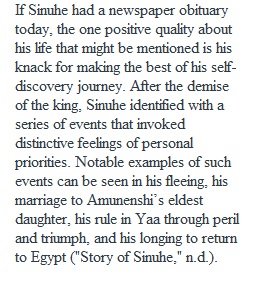


Q Prompts First, if Sinuhe had a newspaper obituary today, what is one positive quality about his life that might be mentioned? Briefly explain. Second, how might an obituary writer tactfully describe Sinuhe's fleeing away from Egypt, so that it doesn't sound shameful? Briefly explain. (Make sure to develop a different idea than you wrote above in the first prompt. Use your imagination.) Third, what is one quality you would want an obituary to mention about you, many many years from now? Briefly explain. Notes on substance and style • As always in this class, be sure to write more than one paragraph. There are three writing prompts above, so it is a good idea to write at least three paragraphs. • Write enough to explore each question. Think of ideas as you write, and then explore them. Write at least several sentences for each prompt. • Make specific references to the ideas presented in the materials in Canvas, and use them to support your answers. • There is no single "right answer" here — instead, imagine something that seems suitable, after you work through the materials in Canvas. Rubric Journal Writing (JW) Journal Writing (JW) Criteria Ratings Pts This criterion is linked to a Learning OutcomeFoundation Does this submission have info related to the materials provided in Canvas, and does it use the Canvas materials as the basis of well-founded responses? Is the assignment complete? 10 to >5.0 pts Full Marks Shows mastery of a wide range of facts from the Canvas material; facts are deployed well to support the argument. Assignment is complete. 5 to >0.0 pts Partial Marks Some facts are drawn from the materials, but there is room for even more; facts may need to be more clearly tied to the argument. Assignment may not be complete. 0 pts No Marks Little or no evidence of drawing on the materials in Canvas to support the argument. Assignment may not be at all complete. 10 pts This criterion is linked to a Learning OutcomeClarity Is it easy to make sense of the ideas written here, or are they obscure? This criterion includes both the mechanics of writing, and the general ease of understanding the big point of the writing. 5 to >3.0 pts Full Marks Clearly and coherently expresses an idea. It rings true. It hits the nail on the head. Shows mastery of the conventions of written English. 3 to >0.0 pts Partial Marks Does a generally ok job of getting the point across. In some places, could use a bit if editing to be clearer. May need some work to adhere closer to the conventions of written English. 0 pts No Marks Very obscure. Hard for a reader to understand the argument. Perhaps does not address the prompt adequately or at all. May not adhere at all to the conventions of written English. 5 pts This criterion is linked to a Learning OutcomeImagination Does this writing show real independence of mind, going beyond the basic facts to make a point that is plausible and compelling? 5 to >3.0 pts Full Marks Goes above and beyond in relating the materials to the world today, or to personal life, or to the educational process (as relevant to the prompt). A real spark of insight. 3 to >0.0 pts Partial Marks Makes a generally good connection with the world today, or personal life, or the educational process (as relevant to the prompt). Basically makes a solid point. 0 pts No Marks Shows little or no imaginative connection between the Canvas materials and the world today. Little or no spark of insight. May be just hard to understand. 5 pts Total Points: 20
View Related Questions